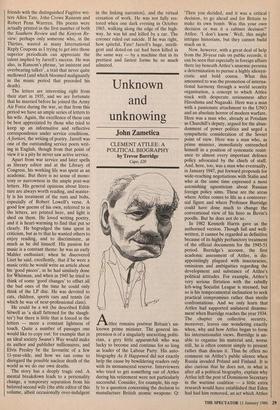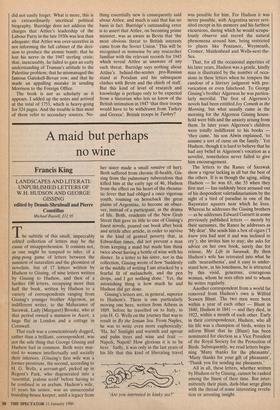Unknown and unknowing
John Zametica
CLEMENT ATTLEE: A POLITICAL BIOGRAPHY by Trevor Burridge
Cape, £20
Attlee remains postwar Britain's un- known prime minister. The general im- pression is of a singularly unexciting politi- cian, a grey little apparatchik who was lucky to become and continue for so long as leader of the Labour Party. His auto- biography As It Happened did not exactly help the cause by bewildering readers only with its monumental reserve. Interviewers who tried to get something out of Attlee during his retirement were not particularly successful. Consider, for example, his rep- ly to a question concerning the decision to manufacture British atomic weapons: Q: `Then you decided, and it was a critical decision, to go ahead and for Britain to make its own bomb. Was this your own decision or was it a cabinet decision?' Attlee: 'I don't know.' Well, this might intrigue historians, but they cannot build much on it.
Now, however, with a great deal of help from the 30-year rule on public records, it can be seen that especially in foreign affairs there lay beneath Attlee's anaemic persona a determination to pursue a highly idiosyn- cratic and bold course. What this amounted to was the promotion of interna- tional harmony through a world security organisation, a concept to which Attlee stuck with desperate seriousness after Hiroshima and Nagasaki. Here was a man with a passionate attachment to the UNO and an absolute horror of modern warfare. Here was a man who, already at Potsdam as Churchill's deputy, argued for the aban- donment of power politics and urged a sympathetic consideration of the Soviet point of view. Here was a man who, as prime minister, immediately entrenched himself in a position of systematic resist- ance to almost every important defence policy advocated by the chiefs of staff. And, here, too, was a man who eventually, in January 1947, put forward proposals for wide-reaching negotiations with Stalin and who at the same time expressed a most astonishing agnosticism about Russian foreign policy aims. These are the areas where Attlee comes to life as a controver- sial figure and where Professor Burridge could have done much to change the conventional view of his hero as Bevin's poodle. But he does not do so.
In 1982 Kenneth Harris gave us the authorised version. Though full and well- written, it cannot be regarded as definitive because of its highly perfunctory treatment of the official documents for the 1945-51 period. Burridge's account, the first academic assessment of Attlee, is dis- appointingly plagued with inaccuracies, omissions and ambiguities regarding the development and substance of Attlee's political attitudes. For example, Attlee's very serious flirtation with the rabidly left-wing Socialist League is stressed, but so is his temperamental inclination to seek practical compromises rather than sterile confrontations. And we only learn that Attlee had supported unilateral disarma- ment when Burridge reaches the year 1934. The chapter on collective security, moreover, leaves one wondering exactly when, why and how Attlee began to form his internationalist views. Burridge is un- able to organise his material and, worse still, he is often content simply to present rather than discuss it. Thus he offers no comment on Attlee's public silence when Russia invaded Poland and Finland. It is also curious that he does not, in what is after all a political biography, explain why Attlee left the post of Dominions Secretary in the wartime coalition — a little extra research would have established that Eden had had him removed, an act which Attlee
did not easily forget. What is more, this is an extraordinarily uncritical political biography. Burridge does not address the charges that Attlee's leadership of the Labour Party in the late 1930s was less than adequate; that Attlee was over-secretive in not informing the full cabinet of the deci- sion to produce the atomic bomb; that he lost his nerve in the 1947 sterling crisis; that, inexcusably, he failed to gain an early understanding of Truman's attitude to the Palestine problem; that he mismanaged the famous Gaitskell-Bevan row; and that he made an appalling mistake in sending Morrison to the Foreign Office.
The book is not as scholarly as it appears. I added up the notes and arrived at the total of 1753, which is heavy-going for 324 pages. And the trouble is that most of them refer to secondary sources. No-
thing essentially new is consequently said about Attlee, and much is said that has no basis in fact. Burridge's outstanding error is to assert that Attlee, on becoming prime minister, was as aware as Bevin that 'the most obvious threat to British interests came from the Soviet Union.' This will be recognised as nonsense by any researcher familiar with the relevant records for 1945 which reveal Attlee as unaware of any such threat. Burridge says nothing about Attlee's behind-the-scenes pro-Russian stand at Potsdam and his subsequent clashes with Bevin and the chiefs of staff. But this kind of level of research and knowledge is perhaps only to be expected from a historian who lets us know of the British intimation in 1947 'that their troops would have to be withdrawn from Turkey and Greece'. British troops in Turkey?



























































 Previous page
Previous page